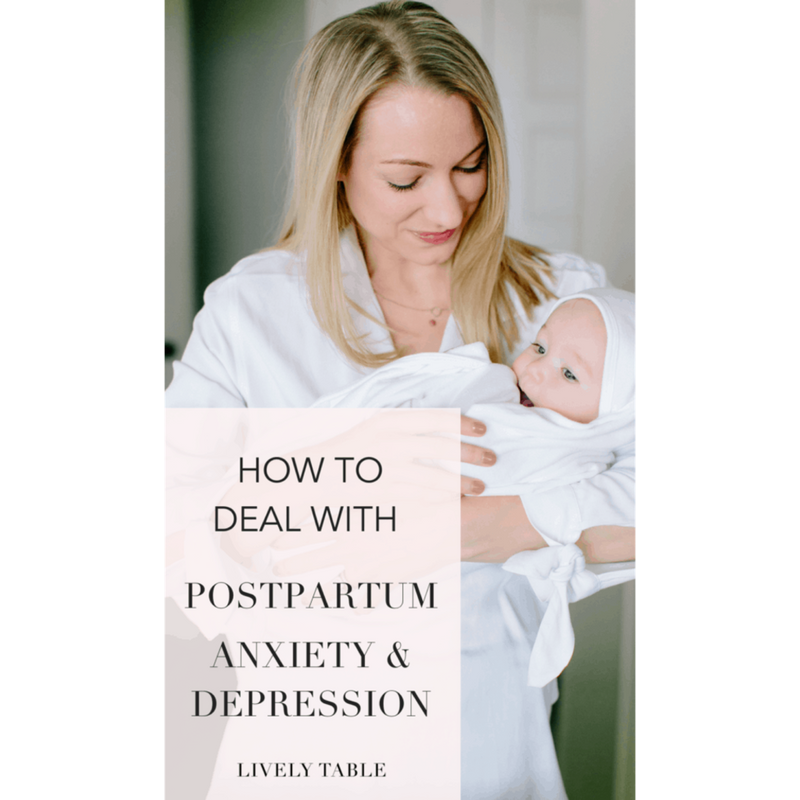
Written by: Kaleigh M.
Postpartum depression, and especially anxiety, can catch a lot of women off guard. Here’s my experience with dealing with both postpartum anxiety and depression. (Part 1 of 2)
I’ve dealt with both depression and anxiety for over 10 years. So when I was pregnant, I knew there was a high likelihood that I would experience postpartum depression once my daughter was born. I was fully prepared to be on the lookout for symptoms. What I wasn’t aware of, was that postpartum anxiety is also a common condition that affects new moms, and that I’d experience a whole new type of anxiety I’d never felt before.
Before becoming pregnant, I managed my generalized anxiety and depression with medication and regular appointments with a therapist. I’ve accepted that these things just a part of my everyday health routine, the same way eating healthy and brushing my teeth are. I tried decreasing the dose of my medication (with the help of my doctor) when we were trying to get pregnant with the hopes of not needing it during the pregnancy, but quickly learned that was a bad idea. My doctor assured me that the medication and dosage were perfectly safe during pregnancy, so I wasn’t worried.
Once my daughter was born, I knew to look for depression symptoms – sadness, loss of interest in things, loss of appetite, changes in sleep, feelings of guilt. I’d read the literature the doctors and hospital provide.
But what I experienced was something completely different.
When my daughter was around 4 months old, I started getting extremely anxious. I couldn’t sit still, I felt like I constantly needed to be doing something and taking on projects around the house – organizing all the closets, kitchen cabinets and pantry. I rearranged my office, buying an entire shelving unit to store all of my props and photography equipment. I was constantly in a state of organizing and getting rid of things I didn’t use. All hardly things that seem important to a normal human when they’re taking care of a newborn. Yet I couldn’t seem to take my mind off of these trivial tasks.
I also felt physical symptoms like I’d never felt before. I would suddenly get tense, every muscle in my body tightening as I was doing something super normal like cooking dinner or watching TV with my husband. I would not be able to breathe deeply despite the fact that I was aware of my super shallow breathing and trying to manage it. It felt like I was constantly on the brink of a panic attack, even though it usually happened at the most mundane times.
On top of the already stressful situation of caring for a colicky newborn with no clue what I was doing, the extreme guilt I felt about not being able to feed my daughter enough, the lack of sleep that comes with a baby, and trying to get any smidge of work done, the anxiety was overwhelming.
I knew something had to change. I did a little research and discovered that postpartum anxiety affects almost as many women as postpartum depression (about 10-15% of all new moms). They can occur together or separately. Yet nobody seems to warn women about postpartum anxiety.

I already had a follow up appointment with my OB-GYN and had made an appointment with primary care doctor for a medication refill anyway. The medication I was on at the time wasn’t safe for breastfeeding at higher doses, so we decided to try another one that was. But both appointments, especially the one with my primary care doctor, left me feeling a little neglected, like I brought up how I was feeling, yet neither doctor really dug in beyond asking me if I felt suicidal (I didn’t). So it was a quick medication change with no plans for follow ups. It was extremely discouraging. I decided to look for a new PCP while trying the new medication.
Then the real struggle began.
Since I didn’t want to go back to my previous PCP, I decided to stick with my OB-GYN for my care at the time. She is amazing, which also means she is very busy and hard to get in to see. So, trying to get the balance right on my medication was a nightmare. I would call the office, only to be told that the next available appointment was in three months and that I could talk to a nurse. Then I would report my symptoms to a nurse, who would tell me she’d talk to the doctor. Then she’d call me back, of course when I was dealing with the baby and wasn’t near the phone, then we’d play phone tag a few times, and finally I would be told by the nurse to bump up my dosage, and that was that. After doing this a few times, I just felt defeated.
All the while, I was struggling with not making enough milk and trying to supplement with fenugreek to increase my milk supply. I started wondering if the fenugreek might be causing my anxiety. So, I resorted to something I hate – I consulted Google. It seemed a few other women had the same question, but with no real answer. I felt confused as ever, still anxious as hell, and unable to get in to see a doctor that would actually help me.
I started to really feel helpless. I now understood why so many people feel lost when trying to navigate any sort of health issue. It’s so hard to get the answers and the care you need in a timely manner. Waiting 3 months to get an appointment for a real problem I’m having now? And having a nurse keep increasing my medication without actually talking to me? That’s unacceptable.
I tried experimenting with stopping the fenugreek, bumping my medication up, taking it back down. Nothing seemed to help. All the while feeling anxious, helpless, stressed, and eventually depressed about the entire situation. It was affecting not only me, but my family. I felt like I didn’t have the emotional capacity or energy to give my baby or my husband the attention and affection they deserved, which only made me feel worse.
I’ll continue my story about postpartum anxiety and depression in another post, but for now, know that if you’re struggling with any of the feelings I described, you’re not alone. PPA and PPD affect 10-15% of women. You may not even know that’s what it is – a lot of women don’t. But you don’t have to struggle in silence. If you’re feeling off, talk to your doctor, talk to other women, talk to a therapist. It does get better, and getting treatment is so worth it (spoiler alert – I did finally start feeling better). You can’t be the best mom if you’re feeling this way. You have to take care of yourself so you can take care of your family, too.
Find similar articles
anxietybabiesbabybalancebasicbasic momblogblog mombloggerbody imageCaliforniacalmcalmingcelebratecoffeecommunityculturedaddadseasyEveryday Lifefamilygood humansguest bloggerhealthhealthyHydratejoykidslifelovemommom blogmom cultureMom Culture Communitymom lifemomculturemomlifemomsmotherhoodmotherhood winging itmotheringnewbornparenthoodparentingplay timepost partumPPAPPDpregnancyraise good humanssmall businessstressStylesummerteachingTiny HumanstoddlersUncategorizedwaterwinging itwishlistworking mama


